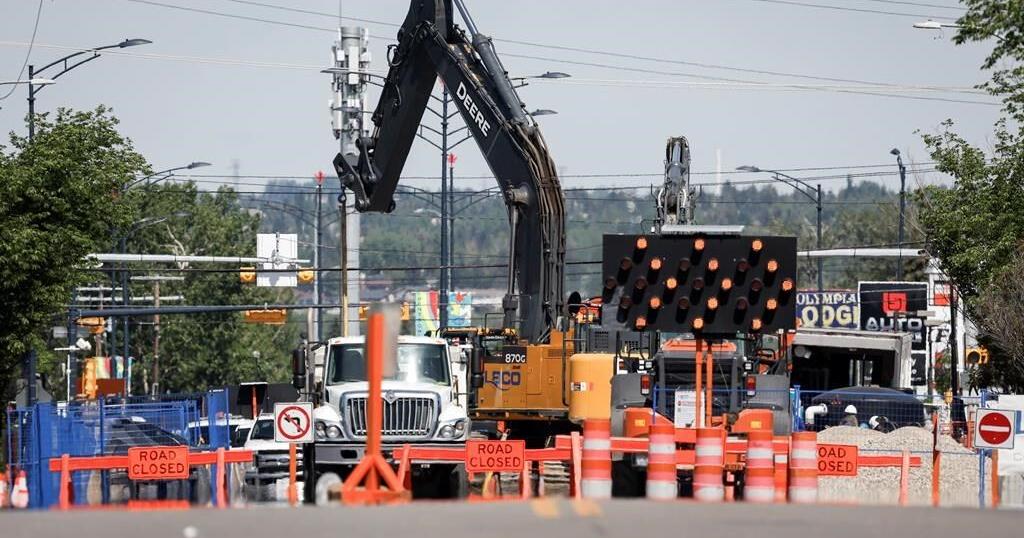CALGARY – Some Calgary residents facing another round of water rationing say they are resigned to their fate, especially when compared with those who lost everything in the recent Jasper wildfires.
“You try and keep everything in perspective,” said Karen York in an interview Thursday.
Karen and Barry York were sitting down for a picnic lunch at Shouldice Park, near where a water main broke on June 5 forcing sweeping water restrictions for Calgary and area residents.
Those restrictions had tapered off and were almost gone until Calgary Mayor Jyoti Gondek announced Wednesday they were being brought back at the end of the month due to new problems with the water line.
June 5 was a memorable day for the Yorks even before the pipe rupture caused a citywide crisis.
There was a fire at their condo in northwest Calgary that damaged dozens of units, though theirs was spared. Having to cut back on showers and laundry didn’t feel like a big deal in light of what their neighbours went through, they said.
“We don’t have pets and we don’t have a garden and we don’t have anything on our balcony plant-wise,” said Karen York.
She said perspective is needed compared with Jasper residents. Wildfires on July 24 destroyed a third of all buildings in the community of 5,000 and the town is yet to reopen.
Some residents at Shouldice Park said they were prepared to follow restrictions once again.
“I guess I’ll be back to wearing dirty clothes again,” Pauline Heldt said with a laugh as she watched her grandson play.
“We’re back to less laundry, less washing dishes and less showering again. It’s crazy.”
This time, she’s planning to make sure she’s got jugs of drinking water filled ahead of time.
Brian Cervi and his wife, Louise, were walking their dog not far from where the water main broke in June.
The water restrictions didn’t trouble them much when they were first brought in, and they said they don’t expect much of an inconvenience when they come back in a few weeks.
But Cervi and his wife said they’re troubled by how something could have gone so wrong with a key piece of city infrastructure.
“It shouldn’t have come to a crisis like this,” said Cervi.
After the June 5 rupture, all residents of Calgary, a city of 1.6 million, along with the communities of Airdrie, Chestermere, Strathmore and Tsuut’ina Nation, were ordered to end all outdoor watering and were asked to voluntarily cut indoor water use by 25 per cent by taking shorter showers, doing less laundry and dishes, and reducing toilet flushes.
Residents, for the most part, complied. By the first week of July, the indoor restrictions ended and the outdoor ones were phased out in stages in the weeks after that.
However, on Wednesday, Gondek said tests along 10 kilometres of the pipe indicated there were new trouble spots that needed to be fixed promptly in order to prevent bigger problems if the line ruptured during the winter.
The sweeping outdoor water bans and indoor voluntary restrictions are now being brought back in as of Aug. 26 and will continue for about a month while the new problems are fixed.
Calgary builders, meanwhile, said they’re glad the city has given them advance notice of a renewed water shutdown to help them cope with a summer of setbacks that have cost millions of dollars.
The Calgary Construction Association says it’s working with the city on ways to mitigate the effects of new water restrictions.
Association president Bill Black said the original June 5 water restrictions disrupted concrete pouring schedules while municipal fire bans played havoc with welding schedules — all leading to the lost revenue.
The fire ban was put in place alongside the water ban to help reduce fires that could prove a disastrous drain on water resources.
“We feel less caught off-guard (than last time),” Black said in an interview.
“We’re confident that the majority of potential disruption can be avoided.”
He said the industry had caught up to the delays when the new round of restrictions were announced Wednesday by Gondek.
This report by The Canadian Press was first published Aug. 8, 2024.
— with files from Fakiha Baig in Edmonton
